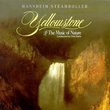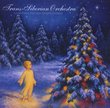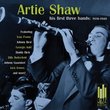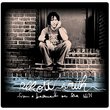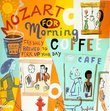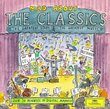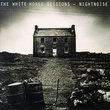| All Artists: Gustav Holst, Richard [1] Strauss, William Steinberg, Boston Symphony Orchestra Title: Holst: The Planets / R. Strauss: Also Sprach Zarathustra Members Wishing: 1 Total Copies: 0 Label: Deutsche Grammophon Original Release Date: 1/1/1971 Re-Release Date: 5/8/2001 Album Type: Original recording remastered Genre: Classical Styles: Forms & Genres, Theatrical, Incidental & Program Music, Symphonies Number of Discs: 1 SwapaCD Credits: 1 UPC: 028946362723 |
Search - Gustav Holst, Richard [1] Strauss, William Steinberg :: Holst: The Planets / R. Strauss: Also Sprach Zarathustra
 | Gustav Holst, Richard [1] Strauss, William Steinberg Holst: The Planets / R. Strauss: Also Sprach Zarathustra Genre: Classical
No Description Available. Genre: Classical Music Media Format: Compact Disk Rating: Release Date: 8-MAY-2001 |
CD DetailsSynopsis
Product Description No Description Available. Genre: Classical Music Media Format: Compact Disk Rating: Release Date: 8-MAY-2001 Similarly Requested CDs
|
CD ReviewsA thirty-year-old treasure. Bob Zeidler | Charlton, MA United States | 11/27/2001 (5 out of 5 stars) "If you've followed the fortunes of the Boston Symphony Orchestra only casually, then you'll probably be thinking that, over the last half-century, this orchestra has had only two music directors: Charles Munch, followed by Seiji Ozawa. (If you were to go back yet another quarter-century, you'd throw in the name of Serge Koussevitsky.) But there was a decade, from the early 60's to the early 70's, when the BSO was led first by Erich Leinsdorf, a fine opera conductor whose strengths did not translate particularly well to the concert stage, and then by William Steinberg, who led it all too briefly for a few years (1969 - 1972). Regrettably, Steinberg made only a handful of recordings with the BSO, and this was probably his finest. For me, Steinberg will best be remembered for his traversal of the Brahms symphonies on Enoch Light's Command Classics label, and for this Boston recording of Gustav Holst's "The Planets." Long a favorite piece of British music for me, I believe I've owned (or at least heard) all of the recorded performances by Sir Adrian Boult (long considered the "owner" of this work), as well as critically-acclaimed recordings by Bernard Hermann, Andre Previn, Sir Malcom Sargent and Leopold Stokowski. But this Steinberg performance immediately went to the top of my list when it first came out on LP thirty years ago. It has also been critically acclaimed by that all-too-British publication, the Penguin Guide, which seldom holds American recordings of British music in such high esteem, particularly when every British conductor of any merit whatsoever has recorded this work. Now, with its reissuance as part of DGG's "The Originals" series, Steinberg's performance is back up there, on the top of my list, getting its fair amount of playing time. I don't believe that any other conductor has provided a "Mars" with anywhere near the visceral excitement that Steinberg supplies here, or the heroic "swagger" of the Elgarian "nobilmente" theme in "Jupiter." In "Saturn" one can feel - if not hear - the organ underpinnings at the close of the movement, and again in the allegro section of "Uranus." The ethereal mysticism of "Neptune," with its wordless chorus, is gauged very well, with a satisfyinlgy realistic fadeout at the end. All-in-all, a true showpiece for the virtuosic work of the BSO soloists, sections and full ensemble, captured in vivid sound. The Strauss companion piece, at first glance an odd partner for the Holst work, is not really a strange discmate at all. "Also Sprach Zarathustra" - like "The Planets" - requires virtuosic solo, section and ensemble work. Joseph Silverstein, long the BSO concertmaster, is about as fine a violin soloist in this work as you're bound to hear. And, lest one forget (and how can one?), the Strauss work begins with the famous Introduction for brass, organ and timpani, so that in a sense it is the use of the organ that provides a point of continuity, so to speak. Unlike far too many recordings of "Also Sprach Zarathustra," in which the organ is either "overplayed" for dramatic effect or is not appropriately in tune with the orchestra, the balance and intonation here are nigh-perfect. Probably - no, make that definitely - the best archival record we'll have of the brief association of Steinberg and the Boston Symphony. At a time in the relatively recent past when it could easily be said that the BSO was one of "the big five." Bob Zeidler" The Best Of The Best R. V. Wendel | NYC, NY United States | 01/26/2005 (5 out of 5 stars) "These 2 recordings are simply the best ones available, and it's due to the combination of a masterful conductor and a world-class orchestra in a superb hall with killer organ, and inspired interpretations. If only RCA or Mercury could have recorded these instead of DGG. Even with thin bass, overly close micing at times, and curiously distant micing at others, the performances survive as the best ever. Much of the magic here is summed up in one word: tempos! Many have noted Steinberg's fast tempos in the Holst, often sighting Mars as particularly too fast. Well, they are plan wrong. The composer himself recorded this suite electrically in 1926. You think Steinberg's 46 minutes is fast? Holst gets through it in under 41! Now some have said the engineers rushed him so as to get the music to fit on the old 78 discs. That is totally false. Others have said he wasn't a good conductor. OK, ensemble sloppiness bears that out, but doesn't hold water when it comes to basic tempi. Holst marked Mars as "Allegro" which means, quite simply, "fast." At a timing of 6:18, Holst conducted it fast. He wanted it fast! Steinberg comes in at 6:34. In every other movement but Uranus, Steinberg is 0:30 to 0:70 slower than Holst, but still closely approximates the interpretations, and those interpretations are superb. Only in Uranus is Steinberg faster than Holst, but at 5:22, it's the tempo you're used to hearing, but with precision that's rarely matched, and an organ gliss that will blow you across the room! Again, on the Strauss, the forward motion is always there, making Zarathustra as wonderfully unified as it can possibly be. Bernstein and the 1962 Karajan [Vienna Phil] in the Planets have superior moments [especially Karajan's use of metal hammers on the chimes in Saturn as specified by Holst] and Reiner and Karajan also turn in superb Zarathustras, but here are both on one CD about as close to perfection as one can get and, I suspect, closest to the composer's intentions." One of the Finest Recordings Ever... Bob Zeidler | 03/31/2004 (5 out of 5 stars) "The heyday of the Boston Symphony is recorded here in all of it's glory. A feverishly intense Also Sprach is simply electrifying. The tonal quality of this recording is excellent with great balances between sections. Of all of the American recordings ever made of Also Spach this is certainly the one to own...wind solos are beautifully phrased and paced..the orchestra Trumpets are splendid and Steinberg has a geniune idea of when blend is important and when musical ideas have to dominate. Compared to the leisurely interpretation of Ormandy(boring!) you cannot only come up with superlatives for this disc!The HOLST is done very well, without any agogic rubato or mannerisms, Steinberg certainly comes out a giant of a Conductor. His was a short tenure iin Boston unfortunately...It was not too be for too long , Steinberg passed away a few years after these landmark recordings."
|

 Track Listings (16) - Disc #1
Track Listings (16) - Disc #1

